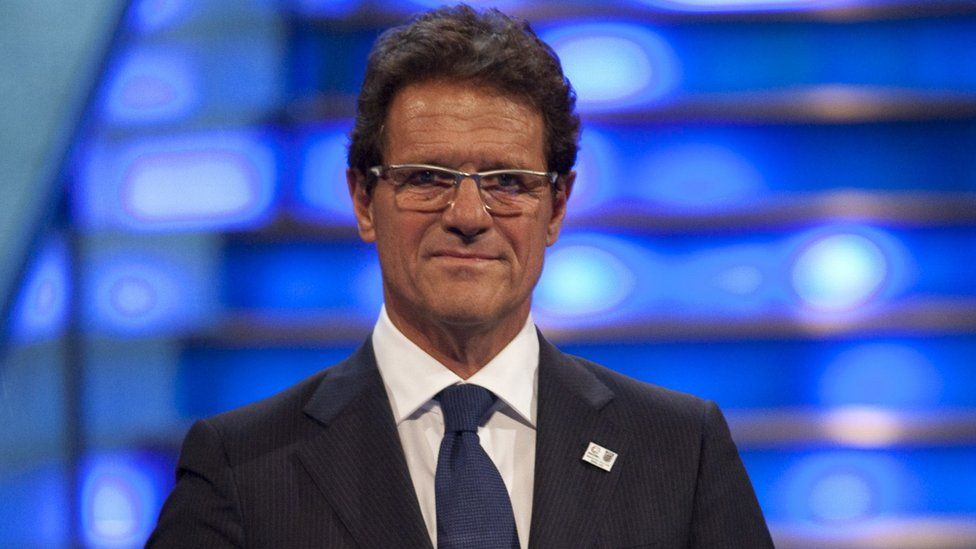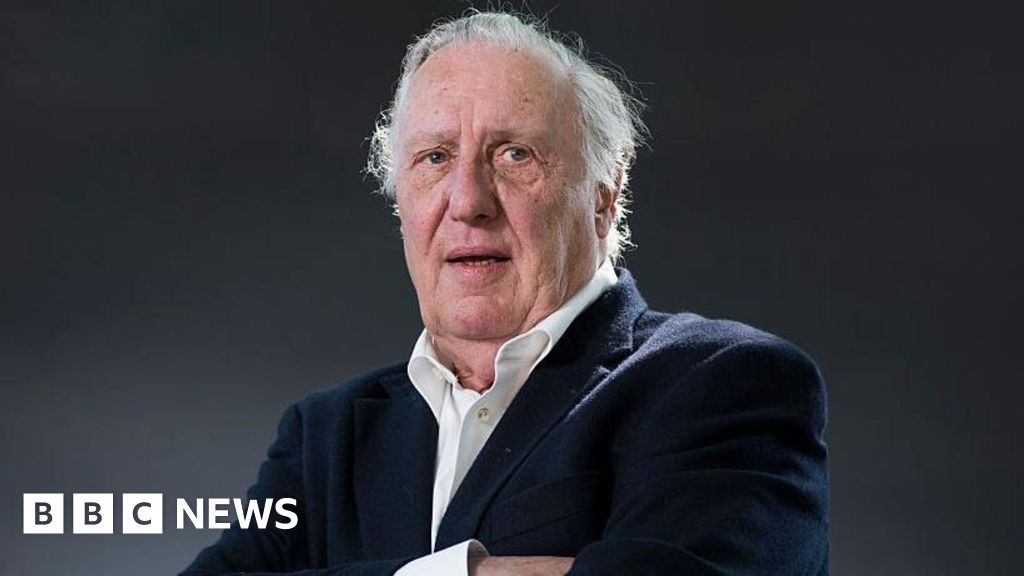ARTICLE AD BOX

'You're not singing anymore' - former England manager Fabio Capello, pictured in 2009, put an end to England World Cup songs
By Colin Paterson
Entertainment correspondent
In 2009, World Cups changed forever.
Fabio Capello, the opera-loving manager of England, banned the team's official World Cup single. The days of players standing in recording studios with headphones draped around their necks were over.
The following year, as the tournament took place in South Africa, Dizzee Rascal and James Corden topped the charts with Shout (Shout for England), a World Cup version of a Tears For Fears classic. The song was not officially endorsed by the Football Association, or indeed by lovers of music. (NME's review: "Almost as bad as England's showing in South Africa.")
Qatar 2022 is the fourth World Cup in a row to which England have headed without an official song. Some might argue that this is a good thing, but for many, the squad single was a crucial part of the excitement of the build-up, a footballing equivalent of who is doing the next Bond theme.
Of course, there will always be numerous unofficial novelty singles released each time, attempting to cash in and become the next Vindaloo (the Fat Les song which reached number two during France '98). These are normally about as enjoyable as opening a packet of World Cup Stickers and getting all doublers.
The last official England World Cup song was World At Your Feet by Embrace, for Germany 2006. It made number three in the charts, but did always had a touch of the Oasis-must-have-said-no feeling about it.
There are several reasons for the decline of the official World Cup squad single.
Kevin Keegan with the England Football team on Top of the Pops in 1982
Firstly, players take themselves more seriously now and are less likely to make themselves available.
The signs were already there back in 1990, when only six of the squad turned up for the recording of the classic World In Motion with New Order. If you have never heard Peter Beardsley's attempt at the John Barnes rap, please treat yourself now.
Another problem for new football songs is that when it comes to the charts, World Cups are now very much like Christmas - the same songs return every time.
Streaming has turned Three Lions into the All I Want For Christmas Is You of major tournaments. Originally released for the 1996 Euros, it has also returned to number one during two different World Cups (1998 and 2018).
This year, a winter World Cup will make things particularly congested, because football and festive songs will be going head-to-head for the first time.
David Baddiel and Frank Skinner are trying to navigate this by taking on themselves, with an updated sleighbell-ridden Three Lions, now with added brackets (It's Coming Home For Christmas).
The song is full of references to the Lionesses success at the Women's World Cup and self-deprecating lyrics ("A football Christmas song / Not at all demeaning").
Image source, Joe Magowan
Image caption,Three Lions, by Baddiel, Skinner and the Lightning Seeds has become England's staple World Cup anthem
The decline of the squad single is not just an English problem, it has affected the tournament as a whole.
This year it appears that, of the 32 competing nations, only the six listed below have officially-endorsed team songs. That is not even a full quarter-finals line-up.
Wales: Yma o Hyd - Dafydd Iwan and Ar Log
Warning: Third party content may contain adverts
The last time Wales played at a World Cup was 1958 and the best-selling single of the year was Elvis Presley's Jailhouse Rock. A nation famous for their love of singing was not going to pass up this chance to celebrate in song.
Dafydd Iwan's Yma o Hyd, which translates as "We're Still Here", was originally released in 1983 and has grown in stature over the years. The stirring anthem has long been a favourite of Welsh Nationalists and football fans.
Instead of cringey shots of players miming in the video, the squad is shown singing along during on the pitch celebrations after qualification.
There is even a little something for Scotland fans; a section of the video highlighting "low moments in Welsh football history" includes a flying Alan Rough save from John Toshack in a crucial qualifier in 1977.
Spain: Toke - Chanel
Warning: Third party content may contain adverts
No footballer has failed a drugs test at the World Cup since Diego Maradona in 1994. Spain calling their official team single Toke might have raised some eyebrows amongst FIFA officials. Fear not, it translates as "Touch".
The song, which combines R&B and Latin rhythms, is performed by Chanel Terrero, who came third in this year in Eurovision with SloMo.
She told El Mundo that in the video she is "booty hypnotic" and the dance routines certainly use more complicated formations than Barcelona under Pep Guardiola.
A translation of the lyrics combines hedonism ("Tequila shot we go crazy") with football ("Iniesta making the goal" - a reference to when Spain won their only World Cup). A shot of two women kissing may limit its chances of being played in the host country.
Ghana: Black Stars (Bring Back the Love) - G.F.A x King Promise
Warning: Third party content may contain adverts
Billed as G.F.A x King Promise, it is worth pointing out that G.F.A. are not a dance act, but rather the Ghana Football Association.
King Promise, who they recruited to provide their official song, is a genuine Afrobeat star, one who is nominated for Best African Act at this year's Mobo Awards.
Black Stars (Bring Back The Love) is a rather enjoyable listen and does not shy away from name checking the players, loyally claiming "Jordan Ayew he be top striker", although in 14 Premier League games for Crystal Palace this season he has yet to score.
The couplet "You know is a party / And we have Thomas Partey" means that Ghana is more likely to win the World Cup than this song is to pick up an Ivor Novello Song writing Award.
Belgium: Warrior - Oscar and the Wolf
Warning: Third party content may contain adverts
Belgium are number two in the FIFA World Rankings. Their World Cup song has also made it to number two in the Belgian charts.
Warrior is a dramatic heartfelt electro-pop anthem, chosen by the Belgium Football Association because of its subject matter - dealing with overcoming your fears.
"Baby I'm a champion / no matter what they say about me," goes the chorus, something that is hard to apply to the national team when they are one of the great under-achievers in international football, having never won a tournament.
The Belgian manager Roberto Martinez has said the lyrics have a "transcendent quality that makes us want to fight in the noble sense of the word". These were not words he used in 2013 when he was the Wigan manager and there was a song released to celebrate their FA Cup Final appearance called The Wigan Wiggle.
Netherlands: Mijn Oranje Hart - Mart Hoogkamer
Warning: Third party content may contain adverts
The Dutch FA turned to TV to pick their official anthem, using a popular show called I Want Your Song, where writers pitch tunes to well- known acts.
Last month, there was a World Cup special and Mart Hoogkamer, a runner up on Holland's Got Talent, was paired with Minj Oranje Hart, which translates as My Orange Heart. It was quite a spectacle.
In the studio, Matt sang what sounded like an 80s Eurovision soft rock ballad with a blistering intensity, while saxophones were played between goalposts, the audience started an impromptu conga and grown men wore plastic cheeses on their heads.
The country that gave us Total Football, now endearingly engaging in total nonsense.
Denmark: Skulder Ved Skulder - The SuperNature, Burhan G, Men's National Team
Warning: Third party content may contain adverts
No country has done more to try and preserve the official team single this World Cup than Denmark, having enticed the whole squad into the recording studio and making it look like they were having a lot of fun.
Skulder Ved Skulder translates as "Shoulder to Shoulder", and Kasper Schmeichel translates as John Barnes, because the former Leicester keeper takes on not one, but two solos in the song.
The sight of a player, who has 86 caps and has won both the Premier League and FA Cup, holding a sheet of paper while wearing headphones and singing "I promise forever that I'll stand up for you", with his vocals bathed in Autotune, gives hope to those who want to believe that the official team single can return to former glories in the future.

 2 years ago
36
2 years ago
36








 English (US) ·
English (US) ·